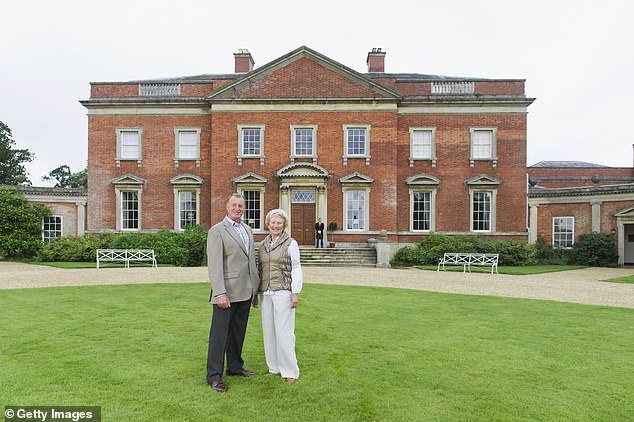An expert has revealed the tell-tale signs that give away whether a person is upper class.
Dani Payne, who specialises education and politics, took to her TikTok to explain the indicators of a person’s apparent ‘class’ in day to day life.
In the clip she explained there are ‘lots of different ways that someone might signal that they’re part of a certain class background.’
She explained that in previous years having a degree with have been an indicator you come from high society, but education has become more egalitarian which means those in the upper class will have to look for other indicators.
Dani explained ‘how you act, how you talk and what you are talking about,’ are all indications of class.
‘Do you know what’s polite conversation? Do you know it’s extremely impolite to ask about money and wealth?
‘Do you have a wide vocabulary, are you well-read, and well spoken? All of these things signal allegiance to a certain class structure.’
Elsewhere Dani claimed ‘memberships to certain elite groups’ and also ‘experiences’ such as whether a person has ever been to the opera, galleries or go on skiing holidays.

Dani Payne, who specialises education and politics, has shared the tell-tale signs that give away whether a person is upper class, or whether they’re working class
‘All of these things signal kind of allegiance to a certain certain class structure. Another is experiences and like, membership to certain, like, elite groups.’
Meanwhile the researcher then discussed the impact of what’s taught to working class children versus upper class.
‘So that might be things how to navigate the education system, which could be which is the best university to apply for, which are the best courses to apply for, do you know how to act in the workplace and wrote a CV etc.
‘All of these things mean that you might have the exact same grades, educational background, etc, as someone who is middle or upper class, but they still have an inherent advantage, because they know all of these kind of like social rules.
‘They know how to act, they know how to get heard?
‘They know how to navigate the education and employment system, and that gives them this inherent advantage in life.’
Many rushed to the comments with their own thoughts on the class system, with a lot of people saying ‘butter’ is a good tell of class.
One person wrote: ‘I always pay attention to what people do with a butter dish.
‘I watched a Tory MPs parents smear their knife along the top of the butter rather than cut a slice, it was obvious to everyone there.’
Another said: ‘I hate that I always notice this, but how people butter and eat bread in a restaurant is an absolute give away.

The expert, who studied Human, Social and Political Sciences at the University of Cambridge , explained that she carried out a study on social class and claimed she was ‘absolutely fascinated’ by the topic






Many rushed to the comments with their own thoughts on the class system, with a lot of people saying ‘butter’ is a good tell of class
To which another replied: ‘Tear bread, add a small piece of butter with the knife and eat it, don’t bite the bread.’
Another added: ‘People who came from a working class background think good manners mean stacking the dishes at the end of service in a restaurant. people who are not working clas would never do that.’
Someone else added: ‘I’ll never forget being asked *where* I ski by a girl I met at uni. Not whether I’ve been skiing, bc to her that was a given, she wanted to know specifically where my family ski’
Another said: ‘My mum came from an upper class family but as the “black sheep” she rebelled and left. She had me out of wedlock (awful scandal for the family who denounced her)she taught me all the upper class techniques. CV and networking being some. It definitely made a difference’
In February, a study carried out by YouGov for HSBC, titled Your Money’s Worth: Defining Wealth in 2025, threw light on what it means to be wealthy in today’s age.
These days, if you have kitchen island and a cleaner, many people across the UK may perceive you as wealthy.
Additionally, having a garden, a driveway or even a car (let alone two!) are seen as ultimate symbols of having money, the study of 2,000 people found.
It appears Gen Z is prioritising the value of a comfortable lifestyle over traditionally viewed luxury goods – with 49 per cent preferring non-material items, compared to 35 per cent of those aged 35-44. .
Meanwhile, the personal income threshold to be considered wealthy came in at £213,000.
The research showed that almost half (49 per cent) of people consider having a portfolio of investments as a sign of wealth, with being able to retire early (48 per cent) and go on holiday (48 per cent) also ranking near the top.
Typical signs of wealth making the list were having a private jet (50 per cent), a yacht (48 per cent), or a sports car (43 per cent).

A new survey has revealed the signs that a person may be seen as wealthy in 2025 – and some surprising contenders made the list (stock image)
But also making the list were more surprising signifiers, including having a kitchen island (10 per cent), a cleaner (25 per cent) and a driveway (19 per cent).
Some may resent having it, but in fact buying a monthly gym membership may cause others to perceive you as wealthy, with around 10 per cent of those surveys listing it.
Having a car (15 per cent) is now seen as a wealthy luxury, while having more than one (27 per cent) is even more extravagant.
Meanwhile, non-tangible factors not traditionally associated with wealth, such as having strong relationships (15 per cent) and investing in self-improvement (11 per cent), also made the list.
For 14 per cent of people, wealth is associated with having good work-life balance and a decent number of hours away from the office.







